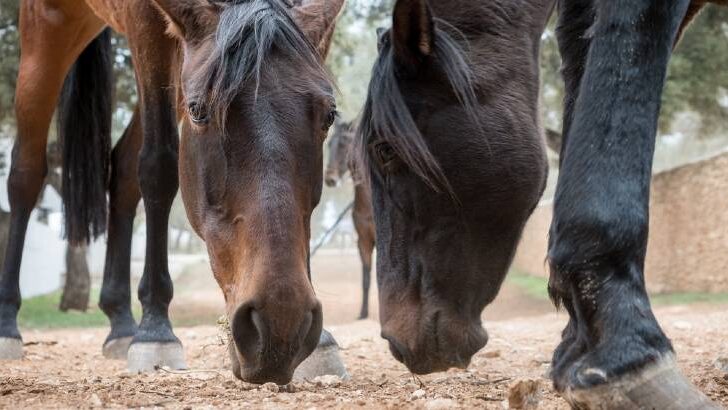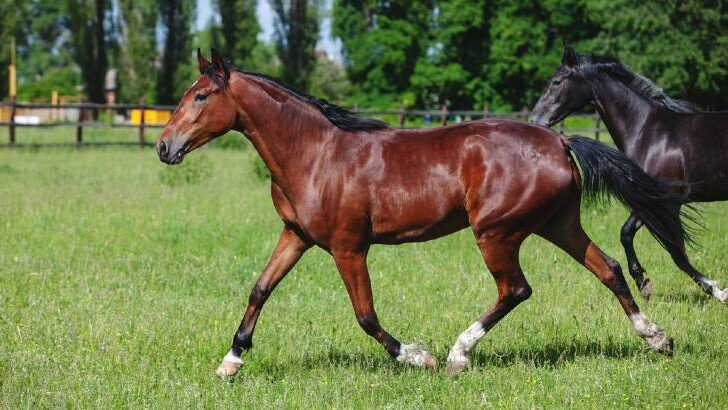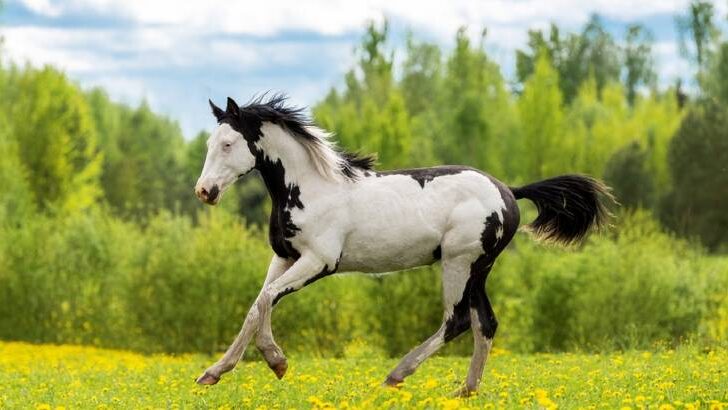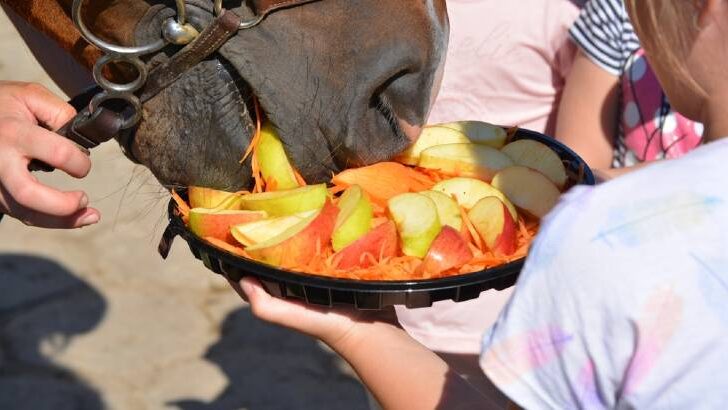Affiliate Disclaimer
As an Amazon Associate I earn from qualifying purchases. It helps me keep the website going. Thank you for your support.
If you’ve ever fallen off and ‘eaten dirt’, as the saying goes, you’ll know that it doesn’t taste very good! Yet, some horses choose to eat or lick dirt, sometimes in large amounts. So, if it doesn’t taste very good, why do they do it? And more importantly, if your horse is eating dirt, is it damaging to their health or merely a harmless habit?
While consuming small amounts of dirt is normal, horses shouldn’t actively seek to eat large amounts. When you see a horse eating dirt, it is usually because the horse’s diet is inadequate, or they are bored or stressed. Eating large amounts of dirt can cause serious illness so it is important to stop or reduce the behavior.
In this article, we will delve into the fascinating world of equine dietary habits and explore the possible explanations for why horses eat dirt.
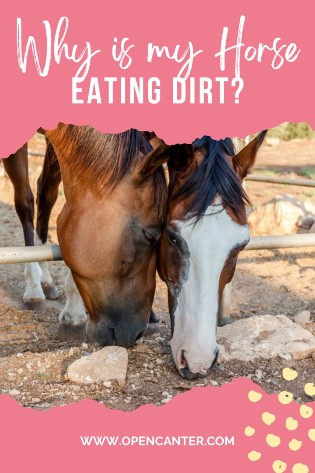
Is My Horse Eating Dirt Because He is Hungry?
One of the most common reasons you will see a horse eating dirt is because of an imbalanced diet. This could be that they are not getting enough feed, or that it is incorrectly balanced.
If your horse is not receiving enough feed, they might eat dirt to fill their stomach. Eating dirt might help relieve feelings of hunger and may also help with stomach discomfort.
Horses are grazing animals, meaning that they are designed to eat little and often. A horse’s stomach is roughly the same size as a football. It also constantly produces stomach acid, unlike humans, who only produce it when we eat.
Consequently, a horse’s stomach is designed to digest small amounts of food, all the time. When the stomach is empty for too long, the acid starts to eat away at the stomach lining. This causes the painful condition known as gastric ulcers.
Horses may eat dirt in an attempt to relieve the discomfort they are feeling because their stomach is empty. The dirt may have a buffering effect and ease the sensation of the acid eating away at the stomach.
Lastly, even though your horse is receiving enough feed, it may not be balanced correctly. If horses do not receive the correct balance of minerals in their diet, they will seek those lacking. Dirt can contain trace amounts of minerals such as zinc, iron, copper, and calcium.
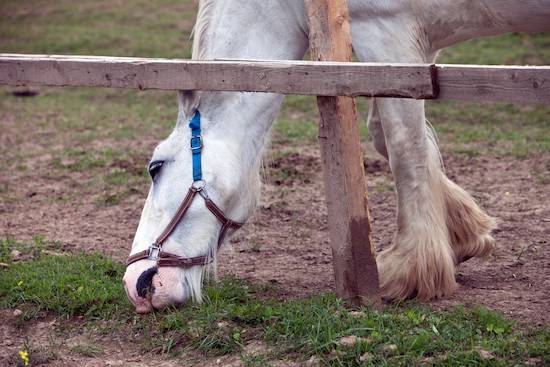
Other Reasons You Might See a Horse Eating Dirt…
The other most common reason you will see a horse eating dirt is boredom or stress. When horses are kept alone or in a small field, they can become bored or lonely. Some horses may resort to eating dirt as a boredom or stress-relieving behavior.
This is like how some horses windsuck or weave when bored or anxious. Once formed, these habits can be very hard to break.
If your horse has poor dental health, they may resort to eating dirt. This could be because they are hungry and cannot chew their normal feed. Or, they may eat dirt in an attempt to add something abrasive to their diet to wear down their teeth.
This is because horses’ teeth evolved to ‘grow’ or erupt constantly (source). In the wild, horses would eat a lot of tough, fibrous plants. Eating these plants required lots of chewing and grinding, which would wear the teeth down.
Today’s domestic horses are often fed softer feeds. Additionally, some horses receive chaff and pellet feeds, some of which may be soaked. This alters how the horse chews their food, and as such their teeth do not wear down as much.
Because of this, the teeth can get too long or develop sharp edges. This is why it is important to have your horse checked by an equine dentist as part of routine care.
Lastly, horses with severe parasite infestations may eat dirt. Most equine parasites live in the digestive system of the horse. It is thought that dirt might provide a buffering effect to calm stomach or intestinal discomfort.
Should I Stop My Horse Eating Dirt?
All healthy horses will consume small amounts of dirt as part of their regular diet. It is simply unavoidable – they will eat small amounts of dirt while grazing or eating feed from the ground. However, if your horse is actively eating or licking large amounts of dirt, you need to stop them from doing so.
Often, eating dirt is a minor symptom pointing to a major cause. For example, a horse that starts eating dirt may have a large stomach worm infestation. The horse is likely to be experiencing discomfort from the worms damaging the stomach.
The health of the horse is usually, but not always, at greater risk due to the cause of the behavior. However, in the cases of dirt-eating due to boredom, the horse may cause itself to get sick.
Eating large amounts of dirt or sand can cause serious health issues. The most major concern is impaction colic. This is where the dirt accumulates in the intestines, and causes a blockage. No feed can pass through the intestines past the blockage.
Colic is a very severe condition and is considered an equine emergency. Horses’ digestive systems only process food one way, meaning they cannot vomit. Moreover, this can be a very painful condition for the horse.
Horses with impaction colic require prompt veterinary attention. The vet may use a stomach tube to try and flush out the impaction and get digestion moving again. Alternatively, the only option may be to operate.
If the impaction cannot be cleared, the horse will not be able to survive. This is why it is important to stop your horse from eating excessive amounts of dirt or sand.
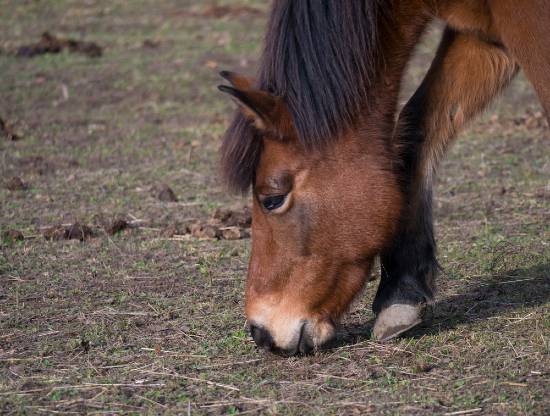
How Can I Stop My Horse From Eating Dirt?
To work out how to stop your horse from eating dirt, you need to find out why they are eating dirt. Some causes can be easier to identify than others.
For example, take a look at your horse’s field. Is there much grass available, and is it good quality? If not, try adding some more hay to your horse’s diet. If the dirt eating stops, it is likely they were just hungry.
For horses who eat dirt as a result of poor diet, it is recommended to consult an equine nutritionist. They can help you design a feeding plan that contains enough fiber and the right balance of minerals.
For horses with gastric ulcers or severe parasite infestations, consult with your veterinarian. They will be able to run tests to provide an accurate diagnosis. They will also be able to provide medication or supplements to help your horse.
If your horse is bored or stressed, the behavior can be harder to fix. This is especially true if the behavior has gone on so long that it has become a habit. There are a number of suggestions to help with boredom or stress.
These include: getting your horse a field or stable companion, giving them more turnout time, or getting them some paddock toys. If your horse only eats dirt from a particular spot, try fencing off this area to help break the behavior.
What Are Some Other Unusual Things Horses Eat?
There are a number of things horses have been seen to eat, often for similar reasons to why they eat dirt. Horses are curious animals, and if something smells okay, they will usually taste it.
However, it becomes a concern when the horse continues to eat something they would not normally eat. For example, the horse who is starving may resort to eating bark, manure, or unusual or poisonous plants. Horses normally avoid anything that is strong-smelling, prickly, or has a bitter or strong taste.
This is why it is important to be vigilant in the removal of poisonous and harmful plants in your horse’s field. Additionally, eating excessive bark or manure can lead to colic or other health issues.
Some horses like the taste of sweat, either from humans or other horses. This is likely because the horse is lacking salt in their diet. The horse might lick your or other horses, or rails where sweaty horses have leaned against. This can be easily fixed by placing a salt or mineral block in your horse’s field.
Some horses appear to like the taste of metal and can be seen licking metal railings. Other horses seem to like the taste of a particular tree or even charcoal! There are even stories of horses self-medicating by eating parts of plants that have herbal properties. For example, horses with access to a willow tree may eat the bark to help with pain relief.
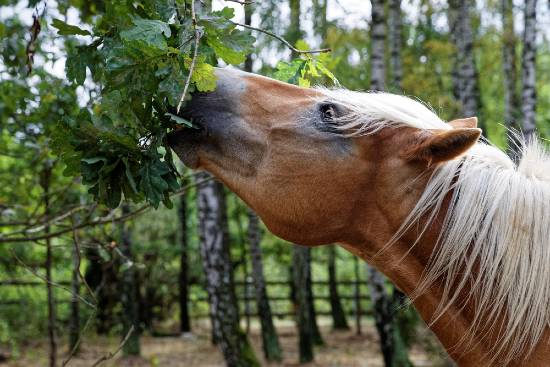
Final Thoughts
There are a number of different reasons why you might see a horse eating dirt. From trying to relieve stomach discomfort or hunger, to being bored, several explanations exist. While consuming a small amount of dirt is okay, eating large amounts of dirt can cause serious health issues. Horses who actively eat dirt should be examined and the cause be identified so the behavior can be stopped.

